Newsletter 24 Oct 2022
Environment: What’s Up in GENeva | 24 – 30 October 2022

The Geneva Environment Network’s weekly newsletter includes the latest information on the global environmental agenda, main events, job vacancies, learning opportunities, as well as other useful resources and updates. Stay tuned and follow us also on Twitter, Facebook, LinkedIn, Youtube, or visit our website regularly for additional updates.
Image of the week | Briefing on the World Wildlife Conference | 19th meeting of the Conference of the Parties to CITES © UNEP/GEN, Marina Garlatti, 18 October 2022.
Preventing Lead Poisoning from Geneva
The International Lead Poisoning Prevention Week kicked off last Sunday under the theme “Say no to lead poisoning”, reminding us of the urgency of action needed to eliminate all sources of lead exposure. On this occasion, the UN Environment Programme Chemicals and Health Branch, the Basel, Rotterdam and Stockholm Conventions Secretariat and the World Health Organisation are hosting a webinar focused on “Advancing work on lead: lessons learned from the work on lead in gasoline, lead in paint and used lead-acid batteries” on 25 October, at 14.00 CEST. The event will reflect on global efforts, successes and lessons learned in tackling lead done within the organization and with partners and to discuss with interested stakeholders the way forward. → More on preventing lead poisoning from Geneva in our update
Peace and the Environment | Challenges and Opportunities
Next week, the Geneva Peace Week will gather experts to discuss key issues on the peacebuilding agenda, including environmental challenges and opportunities. As we prepare for this annual conference, various events on the topic are already taking place this week, including:
- ECCP Briefing | International Crisis Group presents on opportunities for peace & security at COP27 | 24 Oct 2022 16:00 – 17:00 | Online | Geneva Peacebuilding Platform
- Environment of Peace – Security in a New Era of Risk | Launch of the Stockholm International Peace Research Institute (SIPRI) report | 28 Oct 2022 10:30 – 12:00 | Maison de la Paix, Geneva | UNIGE, GCSP, Sweden
Human Rights and the Triple Planetary Crisis
Last week in New York, the General Assembly’s Third Committee hold a dialogue with the UN Special Rapporteurs on the environment, toxics and climate change, presenting their new reports to the Assembly. The discussion included interesting questions from States and insights on advancing the right to a healthy environment. → Read the discussion outcome
- SR Environment Report A77/284: The human right to a clean, healthy and sustainable environment: a catalyst for accelerated action to achieve the Sustainable Development Goals
Press Release: Trillions needed to close finance gap on Sustainable Development Goals, says UN expert - SR Toxics Report Report A/77/183: The impact of toxic substances on the human rights of indigenous peoples
Press Release: Exposure to toxic substances a form of environmental violence against indigenous peoples: UN expert - SR Climate Report A/77/226: Promotion and protection of human rights in the context of climate change
Press Release: Climate change the greatest threat the world has ever faced, UN expert warns
This Tuesday, the UN Special Rapporteur on Human Rights and the Environment is convening a panel discussion in the context of an expert seminar, organized in accordance with Resolution 46/7, adopted by the Human Rights Council in March 2021, which requested the Special Rapporteur to organize an “expert seminar on the role of human rights and environmental conservation in the prevention of future pandemics”. A summary report will be submitted to the Human Rights Council at its 52nd Session in March 2023 and will include any recommendations stemming from the seminar for consideration of further follow-up action.
The 8th session of the Open-Ended Intergovernmental Working Group on Transnational Corporations and other Business Enterprises with Respect to Human Rights is also taking place this week in Geneva, with interesting events organized in parallel to the session.
Ambition to End Plastic Pollution
High Ambition Coalition to End Plastic Pollution
As we get closer to the the first session of the Intergovernmental Negotiating Committee to develop an international legally binding instrument on plastic pollution (Plastic Pollution INC-1), in Punta del Este, new Member States – Ireland, Seychelles, Netherlands, Belgium and Luxembourg – have announced their adhesion to the High Ambition Coalition to End Plastic Pollution, which counts now 30 members from all regions of the world, working together to End Plastic Pollution by 2040. The permanent missions of Ecuador, Norway, Peru, Rwanda and Switzerland will be hosting an in-person briefing on 2 November, 10.00 CET, at CICG. In the afternoon, at 13:30 CET, a new session of the Geneva Beat Plastic Pollution Dialogues will provide an update on the preparations for INC-1.
Plastic Pollution and the Post-2020 Global Biodiversity Framework
Plastic pollution has also made its way into other major upcoming environmental negotiations. The latest report by the Informal Group on the Post-2020 Global Biodiversity Framework proposes new wording for the inclusion of plastic pollution under the Convention on Biological Diversity. While some members of the informal group, which met in Montreal in September, noted the relevance of the UNEA resolution, a direct reference to it was excluded. The report suggests to include the “prevention, reduction and elimination of plastic pollution” or the “elimination of the discharge of plastic waste” under Target 7 of the framework.
Highlights | Recent Scientific Studies and Articles
Meanwhile, we are discovering more everyday about the impacts of plastic pollution and ways to address them. Highlights from our review of recent scientific studies, reports, and articles on the topic include:
- Plastic leaching into farmer’s fields at alarming rate: new report | UNEP | 17 October 2022
The 29th edition of UNEP’s Foresight Brief explores the use of plastic in agriculture and the significant waste problem this entails which impacts on soil health, biodiversity, productivity and food security. - UNEP: Undertaking Negotiations to Eliminate Plasticization | Planet Tracker | 18 October 2022
- The EU Should Stop Exporting its Plastic Waste | Human Rights Watch | 19 October 2022
- Plastic impacts a grossly underestimated ‘one-two punch’ for seabirds: Study | Mongabay | 20 October 2022
Energy, Fossil Fuel and the Climate Crisis
A we get closer to the Sharm el-Sheikh Climate Change Conference, climate action is at the center of many debates and is making the headlines.
Emissions Gap Report 2022
The United Nations Environment Programme will launch the 2022 edition of the Emissions Gap Report: The Closing Window – Climate crisis calls for rapid transformation of societies in a virtual press conference, on Thursday 27 October. The report is the 13th edition in an annual series that provides an overview of the difference between where greenhouse emissions are predicted to be in 2030 and where they should be to avert the worst impacts of climate change.
Turmoil Around the Energy Charter Treaty
Another international instrument has recently been the focus of much debate in the European region. The Energy Charter Treaty, which was originally designed to create a stable investment environment in post-Soviet Europe, is facing major criticism as a barrier to ambitious national climate plans. Negotiations in the spring left EU countries with the option of phasing out protections for fossil fuel investments over the next 10 years. Last week, the Netherlands and France announced it would follow Spain and Poland in leaving the treaty. Various civil society organizations are calling on other States to leave, or for the EU to withdraw as a whole. Officials from Germany and Belgium stated that they were examining their options in that regard.
Last Thursday, Spain, France and Portugal reached an agreement for a new pipeline project to carry hydrogen and gas between Barcelona and Marseille – the green energy corridor linking the Iberian Peninsula to France. While the pipeline will deliver natural gas in the shorter term to alleviate Europe’s energy crisis, it should ultimately serve to distribute green hydrogen and other renewable gases.
EU Parliament on Fossil Fuels and Loss and Damage
Last week, the European Parliament adopted a resolution outlining demands for the UN Climate Change Conference calling on the Commission and all Member States to implement concrete policies, timelines and measures to phase out all direct and indirect fossil fuel subsidies as soon as possible, and encouraging other Parties to undertake similar measures and to work on developing a fossil fuel non-proliferation treaty,
It was absolutely crucial, ahead of the COP27, to remind European leaders that they cannot use the ongoing energy crisis as an excuse to deepen our dependency on fossil fuels. The call made today by the European Parliament to adopt a Fossil Fuel Non-Proliferation Treaty and phase out all direct and indirect fossil fuel subsidies by 2025 must now be heard by the European Commission and Member States.
— Marie Toussaint, French Member of the European Parliament. Read more
The resolution also calls for increasing funding for loss and damage, recognizing that adaptation is an “inevitable necessity”. As such, the EU Parliament “strongly supports the call for developed nations to at least double their collective provision of adaptation finance from 2019 levels by 2025, in line with the Glasgow Climate Pact” and “urges the EU to increase the proportion of finance for adaptation provided through the Global Europe Instrument year by year from 2021 to 2027”.
Geneva Pledge on Human Rights and Climate Change
Meanwhile the signatories of the Geneva Pledge on Human Rights and Climate Action are relaunching their initiative, discussing a joint statement for the UN Climate Change Conference, and planning a public event for the first week of November.
Navigating Energy Transitions: Mapping the road to 1.5°C
A new report from the International Institute for Sustainable Development (IISD) highlights the implications of 1.5°C scenarios for the phase-out of fossil fuels and the scale-up to renewables, barriers to transitions and solutions to such challenges, and tools for governments and financial institutions to navigate the current energy crisis while maintaining climate ambition. It also looks at the implications of the war in Ukraine for energy systems and explores whether Europe can meet its gas demand without the Russian supply.
Green Autumn | Free Time Suggestions
As the colder weather settles in, and Geneva public schools are closed for holidays, we invite you to take this time in the autumn as an opportunity to learn about, discover and explore the environment in Geneva. → Find a diverse range of cultural activities and outdoor excursions in our “Green Autumn in Geneva” resource page. Whether you are working, studying, or enjoying the school break, let it be a source of ideas for your free time!
What (Else) Should I Read Next?
- One Health Joint Plan of Action to address health threats to humans, animals, plants and environment | UNEP | 17 October 2022
UNEP, WHO, FAO and WOAH (formerly OIE) launched their first joint plan on One Health. The five-year plan (2022-2026) focuses on supporting and expanding capacities in six areas: One Health capacities for health systems, emerging and re-emerging zoonotic epidemics, endemic zoonotic, neglected tropical and vector-borne diseases, food safety risks, antimicrobial resistance and the environment. - The climate crisis could increase African country debts by $1 trillion | Debt Justice | 17 October 2022
According to a new report published by Debt Justice and Climate Action Network International, Sub-Saharan Africa will pay the price of climate change. Without adequate financial support from developed countries, Sub-Saharan African countries will have to take on an estimated $1 trillion in debt over the next ten years.
- Twelve International Filmmakers create connections between Humans and Animals through Biodiversity, Climate Change, Environment and Water Risks | Art for the World | 17 October 2022
The Geneva-based NGO Art for the World launched its new project “Interactions“, an anthology of 12 short films questioning the relationship between man and animals, conservation of nature, deforestation, health, marine and wildlife, water, and more. Following the premiere last week in Rome, the project will be showcased at the CBD COP15 in Montreal in December. - Should we talk about solar geoengineering? | Geneva Solutions | 17 October 2022
At the Geneva Science and Diplomacy Anticipator (GESDA)’s summit, held last week in Geneva, various experts discussed the potential and risks of solar radiation management (SRM) technologies to address the climate crisis. While debates remain around their feasibility and potential impacts, there is currently no international governance system to regulate such technologies. - Pistes pour réduire davantage l’impact environnemental de la Suisse | OFEV | 18 October 2022 | In French, German and Italian
This report commissioned by the Swiss Federal Office for the Environment (FOEN) assesses the country’s environmental footprint, showcasing a significant decrease of impact per capita. Despite this progress, the numbers remain way above what the Earth can provide. The report concludes that the country needs to reduce its footprint by two thirds. - L’app de BirdLife pour identifier les oiseaux en Suisse est disponible en français | BirdLife | 18 October 2022
BirdLife Switzerland launched a new app to help non-experts identify birds from the region. With a database listing more than 300 species a birds, the app also allows users to upload images and sound recording to learn more about the birds they can observe in their surroundings. The app is available in French and German. - Dr Kirsten Schuijt named Director General of WWF International | WWF | 17 October 2022
WWF announced the appointment of Dr Kirsten Schuijt, currently Chief Executive of WWF Netherlands, as the next Director General of WWF International, starting January 2023. Marco Lambertini, who has led WWF for the past nine years, will continue as WWF Special Envoy until December 2023 focusing on global initiatives. - Does the right to a healthy environment need a treaty? | Geneva Solutions | 21 October 2022
It has been a year since the Human Rights Council adopted the right to a clean, healthy and sustainable environment. In this piece, Michelle Langrand explores possible next steps for the implementation of R2E with various experts from the Geneva community and beyond. - Armed Conflicts, Environment and Human Rights | Geneva Centre for Human Rights Advancement and Global Dialogue | 20 October 2022
Following a panel event to examine how the environmental effects that occur during and after an armed conflict, can pose a serious threat to livelihoods and communities, the book discusses the role of governments, international organizations, and civil society in adopting preventive measures, strengthening environmental protection, addressing human rights gaps, and empower local communities.
Events
See all
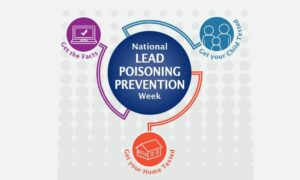

Body Meeting
8th session of the Open-Ended Intergovernmental Working Group on Transnational Corporations and other Business Enterprises with Respect to Human Rights
24 – 28 Oct 2022
Palais des Nations, Room XX
OHCHR
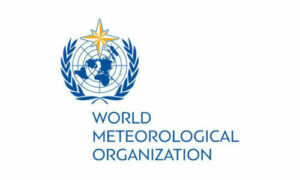
Body Meeting
2nd session of the Commission for Observation, Infrastructure and Information Systems (INFCOM- 2)
24 – 28 Oct 2022
WMO HQ
WMO
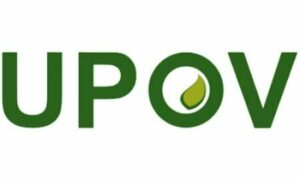
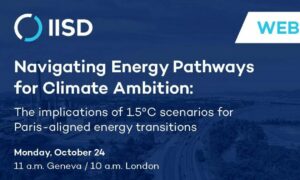
Virtual
Navigating Energy Pathways for Climate Ambition: The implications of 1.5°C scenarios for Paris-aligned energy transitions
24 Oct 2022 11:00 – 12:30
Online
IISD

Virtual
ECCP Briefing | International Crisis Group presents on opportunities for peace & security at COP27
24 Oct 2022 16:00 – 17:00
Online
Geneva Peacebuilding Platform
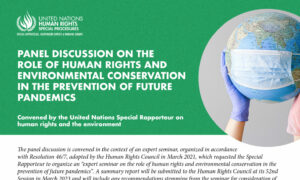
Conference
Panel Discussion on The Role of Human Rights and Environmental Conservation in the Prevention of Future Pandemics
25 Oct 2022 10:00 – 11:30
Palais des Nations, Room XXV & Online | Zoom
Special Procedures of the UN Human Rights Council
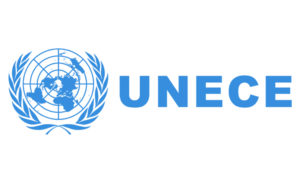
Body Meeting
UNECE Resource Management Week 2022 | 13th Session of the Expert Group on Resource Management
25 Oct 2022 10:00 – 18:00
Palais des Nations, Room XXII & Online
UNECE

Virtual
Environment, climate, conflict, and peacebuilding (ECCP) | Monthly Meeting
25 Oct 2022 14:00 – 15:00
Online
Geneva Peacebuilding Platform
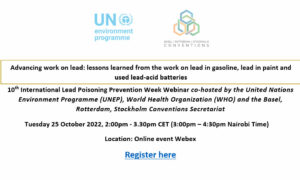
Virtual
Advancing work on lead: lessons learned from the work on lead in gasoline, lead in paint and used lead-acid batteries
25 Oct 2022 14:00 – 15:30
Online
BRS, UNEP Chemicals and Health Branch, WHO
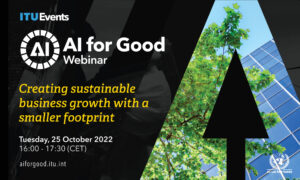
Virtual
AI for Good | Creating sustainable business growth with a smaller footprint
25 Oct 2022 16:00 – 17:30
Online
ITU
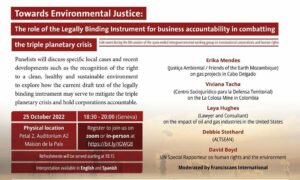
Conference
Towards Environmental Justice: The role of the Legally Binding Instrument for business accountability in combatting the triple planetary crisis
25 Oct 2022 18:30 – 20:00
Maison de la Paix, Auditorium A2 & Online
Franciscans International

Virtual
Online Discussion | Hearing from Farmer Groups on Why Highly Hazardous Pesticides are Used
26 Oct 2022 14:00 – 15:30
Online | Webex
SAICM

Conference
WHO Air Quality Guidelines 2021: A global challenge!
26 Oct 2022 17:00 – 18:30
Campus Biotech, Room G6-02
UNIGE
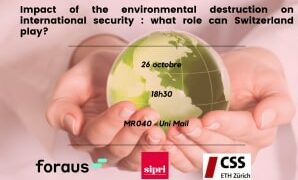
Conference
The Impact of the Environmental Destruction on International Security: What role can Switzerland play?
26 Oct 2022 18:30 – 20:00
Uni Mail, Room MR040
UNIGE, foraus

Workshop
Catalysing Human Security and Climate Resilience with Farmer-Managed Natural Regeneration
27 Oct 2022 09:30 – 12:30
Maison de la Paix, GCSP
GCSP, Geneva Peacebuilding Platform, Right Livelihood Foundation, Global EverGreening Alliance

Virtual
Resource mobilization for the Post-2020 Global Biodiversity Framework
27 Oct 2022 10:00 – 11:30
Online | Zoom
IUCN
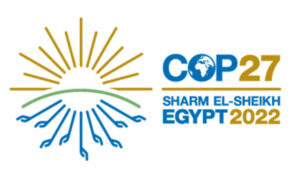
Virtual
Briefing on the State of Preparations of the 27th Conference of the Parties of the United Nations Framework Convention on Climate Change (COP27)
27 Oct 2022 10:30 – 12:00
Online | Zoom
Egypt
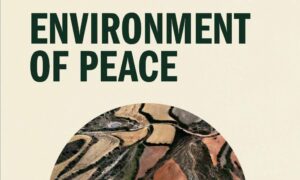
Conference
Environment of Peace | Security in a New Era of Risk
28 Oct 2022 10:30 – 12:00
Maison de la Paix
UNIGE, GCSP, Sweden
Jobs
See all


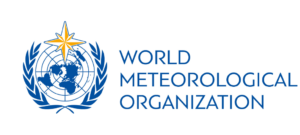
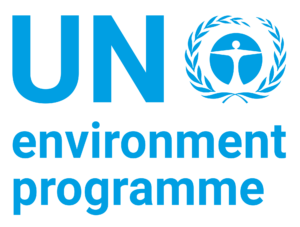




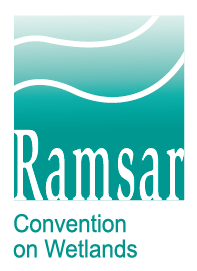


Updates
See allExperts
See all



